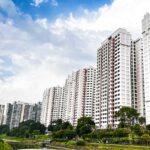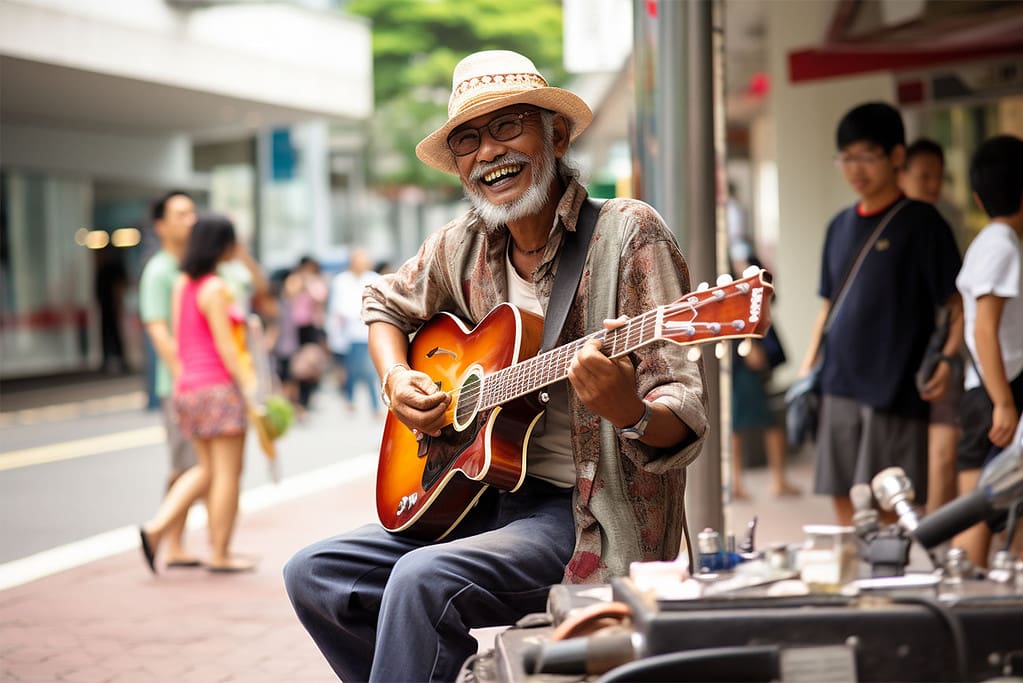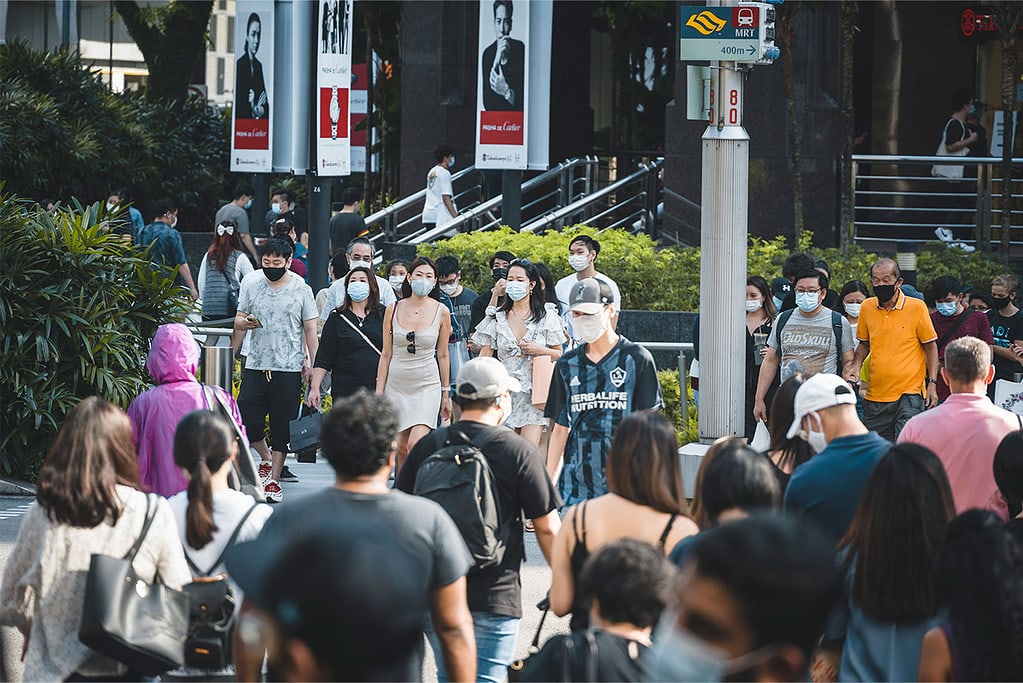In the Lion City of Singapore — a city renowned for its strict laws and immaculate public spaces — the question of public singing stirs considerable attention. No, it’s not illegal to express yourself through song, but there are definitive guidelines defining when, where, and how you can share your musical flair. Debunking the common myth, public singing isn’t outright banned; the city-state’s regulations aim to preserve public decorum and tranquillity. So, while music is your playground, remember to play by the public rules, ensuring that your melodic outpourings don’t jar the public ambiance or unintentionally offend anyone.
Navigating the labyrinthine Singapore legal system, you’ll find that singing is given the nod in approved zones or during licensed occasions. Veer off this path or sidestep necessary permissions; legal hiccups could knock on your door. At the heart of this legal script is an eloquent balance between individual liberties and collective harmony. For locals and tourists, mastering these legal harmonies is crucial to prevent unwittingly hitting a false note with the law. This balancing act gains extra weight in areas with tuned-up regulations like Liquor Control Zones or when the song and dance involve potentially risqué content.
Key Takeaways
- Public singing in Singapore is regulated, requiring permissions and avoiding obscene content to prevent potential legal consequences, including imprisonment and fines.
- Strict guidelines are enforced to maintain public order, requiring permits for public performances and respectful song content, especially in HDB
 High above Singapore's bustling streets, HDB apartments are a vibrant part of the nation's essence. Housing over 80% of its population, they mark Singapore's evolution from a modest start to a contemporary city-state. The Housing and Development Board (HDB) set out in February 1960 to tackle the housing crisis. It aimed to house a booming population affordably and comfortably. This... More communal areas.
High above Singapore's bustling streets, HDB apartments are a vibrant part of the nation's essence. Housing over 80% of its population, they mark Singapore's evolution from a modest start to a contemporary city-state. The Housing and Development Board (HDB) set out in February 1960 to tackle the housing crisis. It aimed to house a booming population affordably and comfortably. This... More communal areas. - Locals and tourists must adhere to Singaporean norms, balancing personal freedom with social harmony and cultural respect, to participate positively in the city’s vibrant cultural scene.
Singapore’s Laws on Public Singing

As you think of belting out your tunes in Singapore’s public spaces, it’s vital to remember to respect Singapore’s strict public order and politeness rules. Understanding the precise legal duties and directives concerning public singing in this city is critical.
Public Order Considerations
As you think about sharing your vocals in Singapore’s public realm, it’s vital to consider factors related to public order. The influential Public Entertainments Act keeps things in check, ensuring performances don’t disrupt the serene rhythm of the city. It permits public singing to help manage noise control and crowd movements. That way, your heartfelt performance doesn’t unintentionally become a public disturbance or violate any public order protocol.
Offences Related to Singing
Though singing is legal, beware of specific content that might ruffle some legal feathers. Watch out for the Penal Code, particularly Section 294, which takes a dim view of public performances of any indecent song or ballad. They could legally call the tune if you slip up and use offensive words or lyrics. The goal is to keep the public realm in taste and orderliness, shielding it from any material that could upset sensibilities.
Permits for Public Performances
If your heart is set on unveiling a public singing spectacle in Singapore, getting the green light from the local authority per the Public Entertainments Act is a savvy move. Indeed, securing a permit is usually a pre-requisite, particularly if you plan to incorporate a musical instrument or employ sound amplification into your act. The local authorities need assurance that your performance aligns with public entertainment standards and veers clear of any prohibited actions outlined in the Act. Additionally, specific locations might require a license before your performance can take center stage.
Consequences of Illegal Singing

Tread carelessly with your song selection in Singapore’s public singing sphere, particularly towards the risqué, and you might hit just the wrong chords with Singapore law. An off-key and unlawful note could set you against severe legal consequences, throwing you into hot water.
Legal Consequences Under Criminal Law
If your public musical performance sways into the realm of the obscene, take heed – it could trigger criminal offenses under Section 294 of the esteemed Singapore Penal Code. Serious infringements in conducting public entertainment, particularly singing, are criminal offenses that aren’t taken lightly and could lead to an actual jail term of up to 3 months.
Monetary Penalties and Civil Repercussions
Besides the potential jail time, you may also face significant financial fines as part of civil penalties. Singapore law stipulates these monetary penalties as a deterrent to singing inappropriate lyrics publicly, primarily aiming to curtail such offenses and uphold public decency. The fine amounts are diverse, varying based on the severity of the offense and whether it’s a subsequent offense violating the regulations.
Picking Your Stage: Location Matters

In Singapore, your choice of stage – be it Orchard Road, a popular spot, a private venue, or another public place – can affect the legal outcome of your performance. Gaining a clear understanding of this distinction is crucial to harmonizing your singing ventures with local laws and preventing public peace and propriety disruptions.
Singing in Private Places
In the privacy of your home or a rented space, you’re free to let your songs ring out as long as you’re not upsetting others with your impromptu concert. But remember, this musical liberty comes with the duty to preserve the serenity of your neighbors. In the densely populated living clusters of HDB flats, thoughtful volume control is critical. Singapore has strict noise regulations to protect the city’s peace, especially during those quiet, sleep-filled night hours.
Public Spaces and Common HDB Areas
When it comes to public spaces, things are a bit different. Here’s what you should keep in mind:
- Permits: If you plan to charm the public areas with your singing, you’ll need a license. It’s all about preserving the public peace.
- Decency: If your song includes lyrics that can be categorized as inappropriate, that’s gonna be an issue, whether you’re in a typical public setting or the common areas of HDB flats.
- Consideration: Your musical endeavors should never throw a spanner in the public’s works. It’s all about picking the right stage and time.
Remember that the communal areas within HDB estates are shared spaces with the same standards of courtesy and decorum. Stick to these guidelines, and you’ll be free to revel in your singing passions in Singapore without stumbling into legal issues.
Singapore’s Lifestyle and Cultures

Singapore prides itself on its unique blend of cultures, and knowing the lifestyle and cultural norms will help you navigate society more quickly. Your awareness and adherence to these norms reflect your respect for the local community.
Community Standards and Expectations
In Singapore, community norms carry significant weight, focusing on building social harmony and upholding public courtesy. Respect forms the bedrock of this societal foundation, necessitating mindfulness in your actions and considering their impacts on others. For example, actions that lead to disruption in public spaces are frowned upon, and manners are expected to toe the line of overall societal decorum. The city-state’s laws uphold public order, and abiding by these communal conventions is vital in your interactions within the community.
Cultural Attitudes Toward Singing
The city-state hums a highly positive vibe regarding singing and music-related expressions. Singapore regularly stages a variety of music-themed events that applaud its kaleidoscopic culture. But remember, while melodies are cherished, belting out songs loudly in public or during quiet hours, particularly in residential sectors, could hit a dissonant note with the peace-loving populace. In certain situations, like during local festivities or live performances, your tuneful contributions are warmly embraced and serve as a harmonious bridge to the community.
Frequently Asked Questions

What penalties does Singapore impose for public disturbances such as unsolicited singing?
In Singapore, illicit public singing, particularly delivering obscene content or causing public nuisances, can find you in hot water with the law under Section 294 of the Penal Code, potentially landing you up to 3 months in jail. Furthermore, heavy fines may also be imposed. The fine rates are subject to the gravity and recurrence of the offenses, with more serious penalties for more severe or repeated violations.
How does Singapore regulate behavior in public spaces for both locals and tourists?
Singapore government enforces strict regulations in public spaces for both residents and tourists. Laws like the Public Entertainment Act necessitate permits for public performances, while the Penal Code makes actions like obscene singing punishable. Regulations in communal residential areas like HDB flats aim to prevent noise disruption. Information is available to tourists, ensuring they know these rules and promoting respect for public spaces and local culture.
Personal Note: I occasionally include affiliate links in my content. These come at no extra cost to you, but they offer me a small commission and help me keep sharing my passion for high-end adventures. Your support is what keeps this journey vibrant and alive. For more details, tap into our policy.
